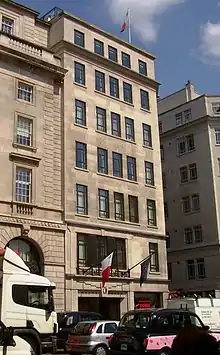Malta–United Kingdom relations
Malta–United Kingdom relations are foreign relations between Malta and the United Kingdom. The two countries share memberships in the Commonwealth of Nations and also shared memberships from 1 May 2004 until 31 January 2020 in the European Union when the UK withdrew from the bloc.
 | |
United Kingdom |
Malta |
|---|---|
History
The British took possession of Malta in 1800, defeating an unpopular French garrison that had taken possession of the islands two years earlier. Malta remained under British control until the end of the Treaty of Paris of 1814. The islands were seen as being of key strategic significance, lying between Gibraltar and the Suez Canal, and became an important shipping station on the sea route between Great Britain and British India. As a result, Malta became the headquarters of the British Mediterranean Fleet until the 1930s.
The islands were essentially under British military rule until 1849, when a partly elected legislative council was formed. In 1921, this was replaced with a fully elected bicameral parliament, which brought Malta a degree of Home Rule within the British Empire.
During World War II, the islands were besieged by Axis forces, but did not fall. The heroism of the people of Malta during that time earned them a collective George Cross, awarded by George VI in 1943. A depiction of the distinguished medal has remained on the Maltese flag to the present day (in a red fimbriation after its original blue canton was removed in 1964).
In the 1950s and 1960s, serious consideration was given in the United Kingdom and Malta to the idea of a political union between the two countries. Despite Malta supporting integration in a 1956 referendum, the plans for it foundered, and Malta gained its independence from the United Kingdom in 1964. The British monarch Queen Elizabeth II remained Queen of Malta until the country became a republic in 1974.

There is a small Maltese community in the United Kingdom. In addition, the British overseas territory of Gibraltar has been influenced by significant immigration from Malta in the 18th and 19th century.
Since the Brexit referendum, the number of applications for Maltese citizenship by British citizens, based on either family link or long-term residence, has seen a spike from 382 in 2016 to 619 in 2017 and 704 only in the first 10 months of 2018.[1]
Diplomatic missions
The High Commission of Malta in London is located in Malta House, on Piccadilly. The British High Commission is located in Valletta.[2]
